新概念英语第一册Lesson81-82
- 格式:ppt
- 大小:9.25 MB
- 文档页数:48
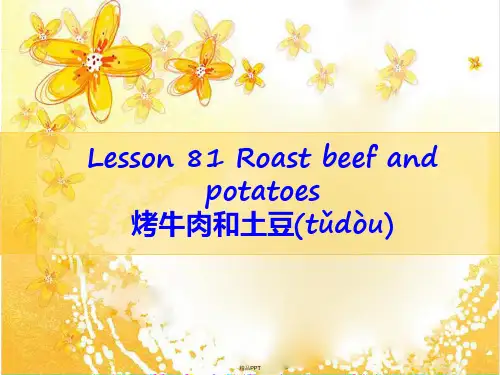
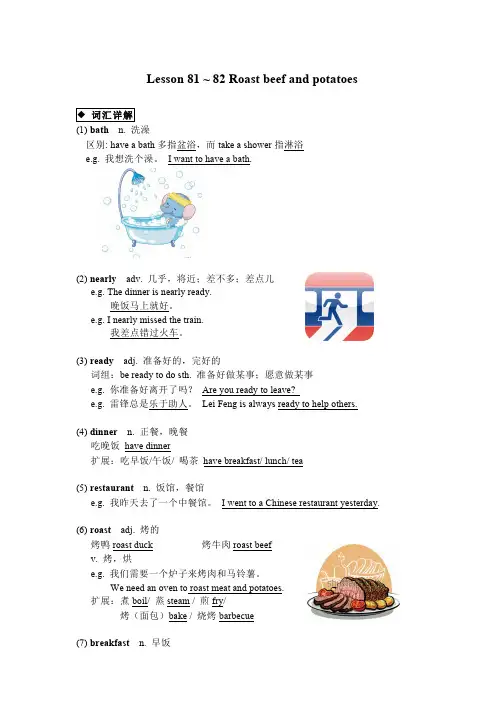
Lesson 81 ~ 82 Roast beef and potatoes◆ 词汇详解(1) bath n. 洗澡区别: have a bath多指盆浴,而take a shower指淋浴e.g. 我想洗个澡。
I want to have a bath.(2) nearly adv. 几乎,将近;差不多;差点儿e.g. The dinner is nearly ready.晚饭马上就好。
e.g. I nearly missed the train.我差点错过火车。
(3) ready adj. 准备好的,完好的词组:be ready to do sth. 准备好做某事;愿意做某事e.g. 你准备好离开了吗?Are you ready to leave?e.g. 雷锋总是乐于助人。
Lei Feng is always ready to help others.(4) dinner n. 正餐,晚餐吃晚饭have dinner扩展:吃早饭/午饭/ 喝茶have breakfast/ lunch/ tea(5) restaurant n. 饭馆,餐馆e.g. 我昨天去了一个中餐馆。
I went to a Chinese restaurant yesterday.(6) roast adj. 烤的烤鸭roast duck 烤牛肉roast beefv. 烤,烘e.g. 我们需要一个炉子来烤肉和马铃薯。
We need an oven to roast meat and potatoes.扩展:煮boil/ 蒸steam / 煎fry/烤(面包)bake / 烧烤barbecue(7) breakfast n. 早饭e.g. 是吃早饭的时候了。
It’s time for breakfast.(8) haircut n. 理发剪头发have a haircut(9) party n. 聚会e.g. 你能来我的生日聚会吗?Can you come to my birthday party?(10) holiday n. 假日暑假/寒假summer/winter holidaye.g. 他正在度假。
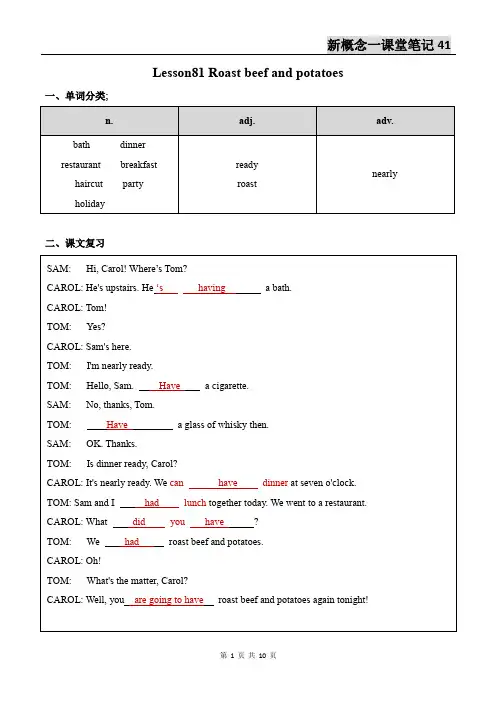
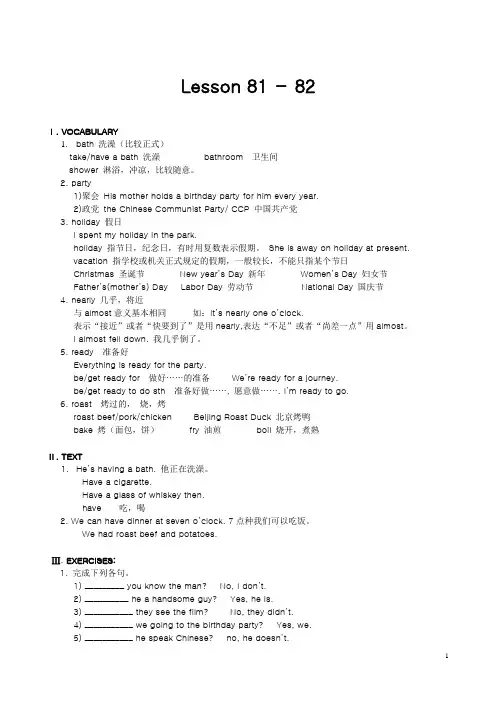
Lesson 81 –82Ⅰ. VOCABULARY1.bath 洗澡(比较正式)take/have a bath 洗澡bathroom 卫生间shower 淋浴,冲凉,比较随意。
2. party1)聚会His mother holds a birthday party for him every year.2)政党the Chinese Communist Party/ CCP 中国共产党3. holiday 假日I spent my holiday in the park.holiday 指节日,纪念日,有时用复数表示假期。
She is away on holiday at present.vacation 指学校或机关正式规定的假期,一般较长,不能只指某个节日Christmas 圣诞节New year’s Day 新年Women’s Day 妇女节Father’s(mother’s) Day Labor Day 劳动节National Day 国庆节4. nearly 几乎,将近与almost意义基本相同如:It’s nearly one o’clock.表示“接近”或者“快要到了”是用nearly,表达“不足”或者“尚差一点”用almost。
I almost fell down. 我几乎倒了。
5. ready 准备好Everything is ready for the party.be/get ready for 做好……的准备We’re ready for a journey.be/get ready to do sth 准备好做……, 愿意做……. I’m ready to go.6. roast 烤过的,烧,烤roast beef/pork/chicken Beijing Roast Duck 北京烤鸭bake 烤(面包,饼)fry 油煎boil 烧开,煮熟Ⅱ. TEXT1.He’s having a bath. 他正在洗澡。
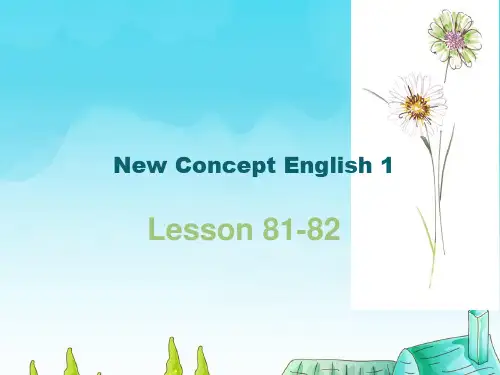
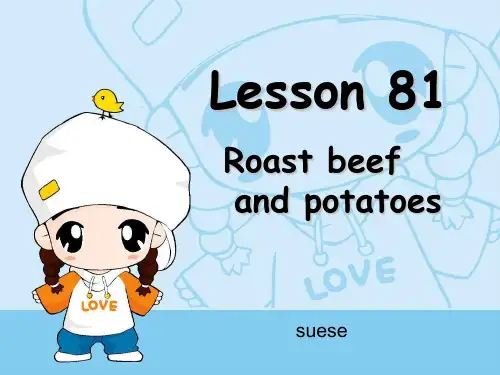
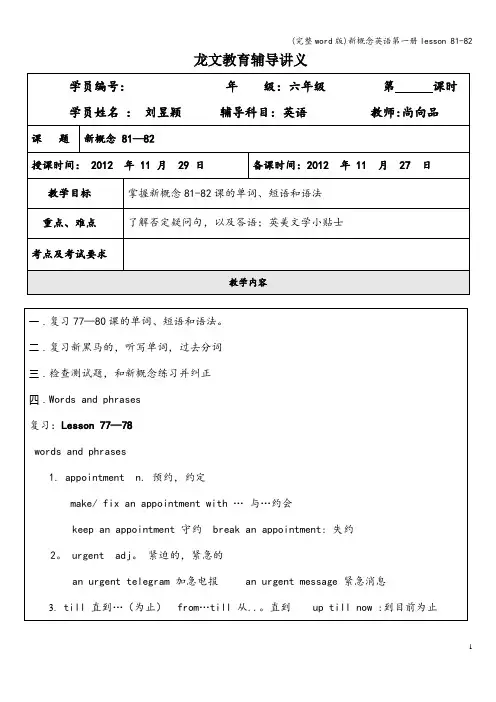

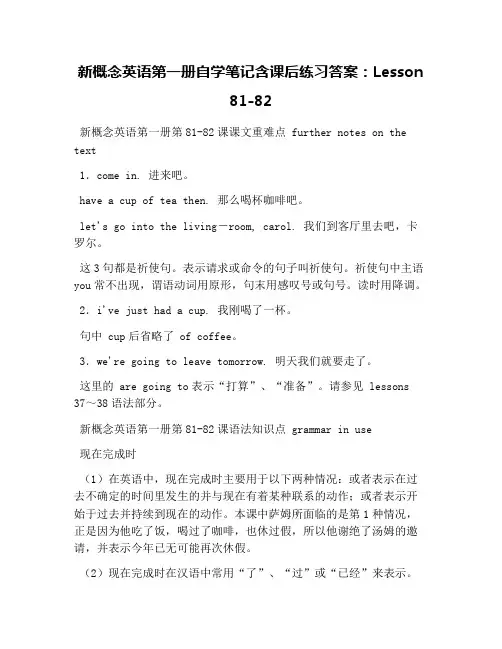
新概念英语第一册自学笔记含课后练习答案:Lesson81-82新概念英语第一册第81-82课课文重难点 further notes on the text1.come in. 进来吧。
have a cup of tea then. 那么喝杯咖啡吧。
let's go into the living-room, carol. 我们到客厅里去吧,卡罗尔。
这3句都是祈使句。
表示请求或命令的句子叫祈使句。
祈使句中主语you常不出现,谓语动词用原形,句末用感叹号或句号。
读时用降调。
2.i've just had a cup. 我刚喝了一杯。
句中 cup后省略了 of coffee。
3.we're going to leave tomorrow. 明天我们就要走了。
这里的 are going to表示“打算”、“准备”。
请参见 lessons 37~38语法部分。
新概念英语第一册第81-82课语法知识点 grammar in use现在完成时(1)在英语中,现在完成时主要用于以下两种情况:或者表示在过去不确定的时间里发生的并与现在有着某种联系的动作;或者表示开始于过去并持续到现在的动作。
本课中萨姆所面临的是第1种情况,正是因为他吃了饭,喝过了咖啡,也休过假,所以他谢绝了汤姆的邀请,并表示今年已无可能再次休假。
(2)现在完成时在汉语中常用“了”、“过”或“已经”来表示。
(3)现在完成时由 have/has+ 过去分词构成,单数第 3人称用has,其他人称皆用have。
规则动词的过去分词与过去式相同,而不规则动词的过去分词则无统一的规律可言,需特别加以记忆。
(4)一般现在完成时通常与表示不确定的时间副词或短语连用如just, already, before, never, ever, twice, three times等。
新概念英语第一册第81-82课词汇学习 word study1. leave v.(1)离开,出发:the train is going to leave in 5 minutes. 火车将于5分钟后开出。
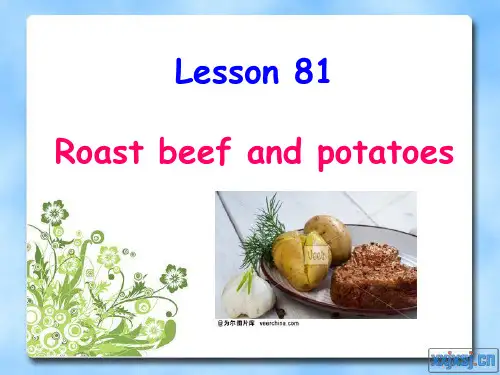
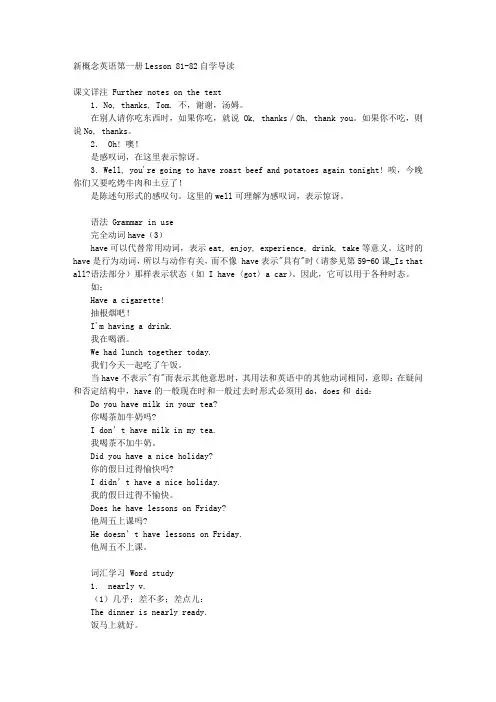
新概念英语第一册Lesson 81-82自学导读课文详注 Further notes on the text1.No, thanks, Tom. 不,谢谢,汤姆。
在别人请你吃东西时,如果你吃,就说Ok, thanks/Oh, thank you。
如果你不吃,则说No, thanks。
2. Oh! 噢!是感叹词,在这里表示惊讶。
3.Well, you're going to have roast beef and potatoes again tonight! 唉,今晚你们又要吃烤牛肉和土豆了!是陈述句形式的感叹句。
这里的well可理解为感叹词,表示惊讶。
语法 Grammar in use完全动词have(3)have可以代替常用动词,表示eat, enjoy, experience, drink, take等意义。
这时的have是行为动词,所以与动作有关,而不像 have表示"具有"时(请参见第59-60课_Is that all?语法部分)那样表示状态(如 I have〈got〉a car)。
因此,它可以用于各种时态。
如:Have a cigarette!抽根烟吧!I'm having a drink.我在喝酒。
We had lunch together today.我们今天一起吃了午饭。
当have不表示"有"而表示其他意思时,其用法和英语中的其他动词相同,意即:在疑问和否定结构中,have的一般现在时和一般过去时形式必须用do,does和 did:Do you have milk in your tea?你喝茶加牛奶吗?I don’t have milk in my tea.我喝茶不加牛奶。
Did you have a nice holiday?你的假日过得愉快吗?I didn’t have a nice holiday.我的假日过得不愉快。